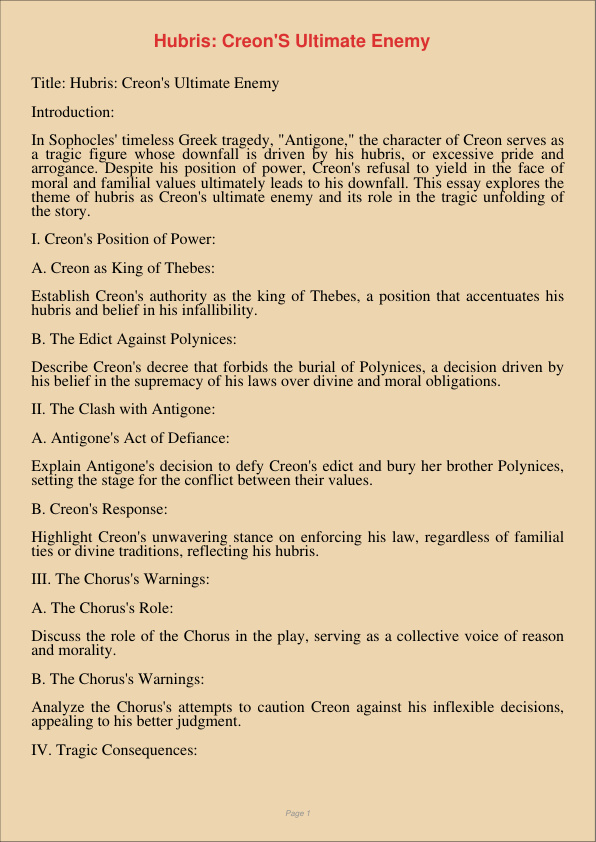
Title: Hubris: Creon’s Ultimate Enemy
Introduction:
In Sophocles’ timeless Greek tragedy, “Antigone,” the character of Creon serves as a tragic figure whose downfall is driven by his hubris, or excessive pride and arrogance. Despite his position of power, Creon’s refusal to yield in the face of moral and familial values ultimately leads to his downfall. This essay explores the theme of hubris as Creon’s ultimate enemy and its role in the tragic unfolding of the story.
I. Creon’s Position of Power:
A. Creon as King of Thebes:
Establish Creon’s authority as the king of Thebes, a position that accentuates his hubris and belief in his infallibility.
B. The Edict Against Polynices:
Describe Creon’s decree that forbids the burial of Polynices, a decision driven by his belief in the supremacy of his laws over divine and moral obligations.
II. The Clash with Antigone:
A. Antigone’s Act of Defiance:
Explain Antigone’s decision to defy Creon’s edict and bury her brother Polynices, setting the stage for the conflict between their values.
B. Creon’s Response:
Highlight Creon’s unwavering stance on enforcing his law, regardless of familial ties or divine traditions, reflecting his hubris.
III. The Chorus’s Warnings:
A. The Chorus’s Role:
Discuss the role of the Chorus in the play, serving as a collective voice of reason and morality.
B. The Chorus’s Warnings:
Analyze the Chorus’s attempts to caution Creon against his inflexible decisions, appealing to his better judgment.
IV. Tragic Consequences:
A. Antigone’s Sacrifice:
Discuss the tragic end of Antigone, who chooses to die rather than yield to Creon’s authority.
B. Haemon’s Desperation:
Explore the doomed love between Creon’s son, Haemon, and Antigone, and Haemon’s desperate attempts to reason with his father.
V. Recognition of Hubris:
A. Teiresias’s Prophecy:
Describe Teiresias’s prophecy of doom, which explicitly accuses Creon of hubris and predicts the calamities that will befall him.
B. Creon’s Realization:
Highlight Creon’s eventual recognition of his hubris as the source of his suffering, as he witnesses the tragic consequences of his decisions.
VI. The Catharsis:
A. Tragic Catharsis:
Discuss how Creon’s downfall and realization of his own hubris evoke feelings of pity and fear in the audience, fulfilling the requirements of a classical Greek tragedy.
B. The Power of Hubris:
Reflect on the enduring lesson that hubris, particularly when it clashes with moral principles and familial bonds, remains a timeless and devastating human flaw.
Conclusion:
In “Antigone,” Creon’s hubris serves as his ultimate enemy, leading to his tragic downfall and the suffering of those around him. The play explores the consequences of rigid authority when it clashes with familial and moral values, highlighting the timeless theme of human pride and arrogance. Creon’s tragic journey serves as a reminder of the dangers of unchecked hubris and the enduring relevance of classical Greek tragedies in exploring the complex nature of human character and fate.
「真诚赞赏,手留余香」
真诚赞赏,手留余香
使用微信扫描二维码完成支付
